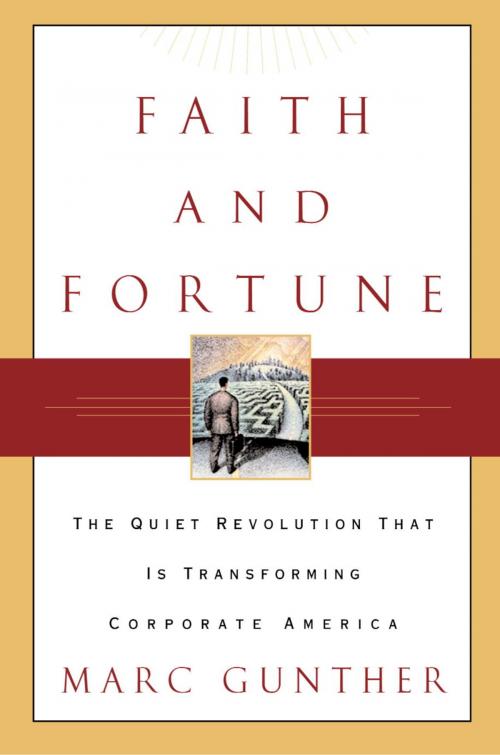Faith and Fortune
The Quiet Revolution to Reform American Business
Business & Finance, Economics, Free Enterprise, Business Reference, Business Ethics, Corporate History| Author: | Marc Gunther | ISBN: | 9781400097562 |
| Publisher: | The Crown Publishing Group | Publication: | October 12, 2004 |
| Imprint: | Crown Business | Language: | English |
| Author: | Marc Gunther |
| ISBN: | 9781400097562 |
| Publisher: | The Crown Publishing Group |
| Publication: | October 12, 2004 |
| Imprint: | Crown Business |
| Language: | English |
Lately the headlines have delivered dispiriting news about wrongdoing and scandal in business. But behind the headlines lies a surprising, untold story: Corporate America is changing for the better. Faith and Fortune tells the stories of the extraordinary people who are leading the way and the admirable companies they have built.
This book is called Faith and Fortune because faith provides the fuel that energizes these people as they strive to do business better and to find meaning in their work. Some have faith in God; others do not. But all have faith in the goodness of people and in the possibility of change. Most of all, they believe that corporations can become a powerful force for good in the world, and that they can—and should—serve people and not the other way around.
Faith and Fortune argues that an exciting new model of conducting business is taking hold, not only in small, socially responsible companies like Ben & Jerry’s but inside such bulwarks of the Fortune 500 as Ford, Citigroup, and DuPont. Bit by bit, almost imperceptibly, this new model is replacing a century-old approach that was rooted in the industrial era and looked at business as a series of discrete, win-lose transactions: Executives tried to pay their workers and suppliers as little as possible, charge their customers as much as they could, and maximize their short-term profits. Today, by contrast, forward-thinking executives build their businesses by developing a network of long-lasting, win-win relationships. Great companies serve their workers, customers, shareholders, and the common good.
Powerful forces are driving these changes, including the desire of companies to attract and engage their workforce, the emergence of the 1960s’ generation to positions of corporate power, the spirituality-in-the-workplace movement, the rise of social investing, and the growth and sophistication of activist groups.
At once realistic and inspiring, Faith and Fortune profiles companies and people who represent the best of business and exemplify these new values. Among the stories told here:
•UPS creates opportunities for immigrants and minorities, promotes from within, and provides its people with a much-valued sense of community
•Southwest Airlines, the fun-loving airline, has built the concept of servant leadership into its storied culture
•Starbucks provides stock options and health insurance even to part-time workers and builds sustainable business models for coffee growers in the developing world
•Timberland has turned community services into a valuable corporate asset
Other companies profiled here include Hewlett-Packard, Herman Miller, Staples, PepsiCo, Domini Social Investments, Tom’s of Maine, and Greyston Bakery. The book also includes a chapter exploring what the great religious traditions have to teach today’s businesspeople about creating sustainable enterprises and an analysis of the business case for corporate social responsibility.
Faith and Fortune is a thoughtful, original, and important book that will reshape the debate about the role of business in America.
Lately the headlines have delivered dispiriting news about wrongdoing and scandal in business. But behind the headlines lies a surprising, untold story: Corporate America is changing for the better. Faith and Fortune tells the stories of the extraordinary people who are leading the way and the admirable companies they have built.
This book is called Faith and Fortune because faith provides the fuel that energizes these people as they strive to do business better and to find meaning in their work. Some have faith in God; others do not. But all have faith in the goodness of people and in the possibility of change. Most of all, they believe that corporations can become a powerful force for good in the world, and that they can—and should—serve people and not the other way around.
Faith and Fortune argues that an exciting new model of conducting business is taking hold, not only in small, socially responsible companies like Ben & Jerry’s but inside such bulwarks of the Fortune 500 as Ford, Citigroup, and DuPont. Bit by bit, almost imperceptibly, this new model is replacing a century-old approach that was rooted in the industrial era and looked at business as a series of discrete, win-lose transactions: Executives tried to pay their workers and suppliers as little as possible, charge their customers as much as they could, and maximize their short-term profits. Today, by contrast, forward-thinking executives build their businesses by developing a network of long-lasting, win-win relationships. Great companies serve their workers, customers, shareholders, and the common good.
Powerful forces are driving these changes, including the desire of companies to attract and engage their workforce, the emergence of the 1960s’ generation to positions of corporate power, the spirituality-in-the-workplace movement, the rise of social investing, and the growth and sophistication of activist groups.
At once realistic and inspiring, Faith and Fortune profiles companies and people who represent the best of business and exemplify these new values. Among the stories told here:
•UPS creates opportunities for immigrants and minorities, promotes from within, and provides its people with a much-valued sense of community
•Southwest Airlines, the fun-loving airline, has built the concept of servant leadership into its storied culture
•Starbucks provides stock options and health insurance even to part-time workers and builds sustainable business models for coffee growers in the developing world
•Timberland has turned community services into a valuable corporate asset
Other companies profiled here include Hewlett-Packard, Herman Miller, Staples, PepsiCo, Domini Social Investments, Tom’s of Maine, and Greyston Bakery. The book also includes a chapter exploring what the great religious traditions have to teach today’s businesspeople about creating sustainable enterprises and an analysis of the business case for corporate social responsibility.
Faith and Fortune is a thoughtful, original, and important book that will reshape the debate about the role of business in America.















